Germs, Gladys Kravitz & Productivity: Why “Clean Off Your Desk Day” Isn’t Enough
As I write this post, a thick blanket of snow has covered, and somewhat paralyzed, my geographic region. There are only so many snowpeople one can make, so many times one can read the same school closings scrolling across the screen, before a bit of cabin fever starts to set in. All day, I’ve been pleased to read tweets and updates in observance of Clean Off Your Desk Day.
This holiday was started by Anne Chase Moeller, daughter of the author of Chase’s Calendar of Events, who found her father’s desk to be overwhelmingly cluttered. Mr. Chase is certainly not the first to find himself in such a predicament, and if he dealt with his desk the way most people do, he probably didn’t take much time out to worry. Indeed, clutter’s insidious creep doesn’t necessarily worry cubicle-dwellers and desk doyennes until something goes missing.
But a disorganized desk is problematic even if you can find everything you need, and you almost certainly can’t find it as quickly as you’d like. A disorganized desk can be dangerous to one’s physical and mental health, productivity, relationships and more.
Frequent readers of Paper Doll know I believe organizing is not just about the aesthetics of keeping things tidy–it’s about improving function. A clean, organized desk preserves at least five basic life and work essentials:
HEALTH
Sensitive readers may wish to avert their eyes from these next paragraphs. According to a study by University of Arizona environmental microbiologist Dr. Charles Gerba, co-author of The Germ Freak’s Guide to Outwitting Colds and Flu,

a typical desk may harbor up to ten million bacteria. For comparison, that’s 400 times the amount found on the average toilet seat. Yikes. (Paper Doll imagines that some readers may choose to avoid stranger’s desks and powder rooms after that little statistic.)
Telephones are the worst culprits, with over 25,000 germs in an average square inch of space, and the contamination on desktops (likely a result of all those lunches and mini-meals at the desk) clocks in at 20,197 germs per square inch. And lest you think that you’re safe if your laptop is your desk, keyboards can sport about 3300 germs/square inch.
The solution? Set up a card table, rolling cart or even a sheet on the floor and move everything you can remove from your desk. (If you move the computer, be sure to turn it off and unplug it, first.) Use disinfecting wipes to clean your desktop, telephone, keyboard, mouse, electronic gadgets, printer keypad, stapler and all of the doodads you use at your desk. Check your computer’s manual regarding preferred techniques for cleaning and de-germifying the monitor and computer, itself.
Evicting germs shouldn’t be saved for an annual Clean Off Your Desk Day or even Get Organized Month. To keep microbes at bay, aim to deep-clean your desk weekly, and take time to de-germ after eating at your desk or letting someone else use your phone.
SANITY
Clutter is distracting, and distractions are unnerving. It’s already hard enough to pay bills, sign permission slips or plan business tasks with the environmental clutter of phone calls and interruptions deterring your focus. Tangible clutter on and around your desk, whether comprised of magazines and recipes or expense reports and resumes, too easily hides your work priorities under sedimentary rock-like layers while sending out a siren call, forcing you to cast your glance on low-priority attention-stealers.
Every time you test three pens before you find one that does have ink and doesn’t leave blobs all across the page, your patience wears just a little thinner. Each time you must flip through every sticky note pasted to your monitor or floating around your desk to find a password so you can meet a deadline, your blood pressure increases incrementally.
To overcome overwhelm, read If You’re Drowning In Paper Build A Raft and then set alarms to remind you to periodically:
- File away stray information (digitally, or in your tickler file or filing cabinet)
- Clean your desk and put away projects you’ve completed
- Digitize as much of your loose paper information as possible
Of course, avoiding distractions that make you kooky isn’t the only way to keep your desk time cheery. Invest in accessories that brighten your mood to incline you to stick with your organizing rituals. Whether you’re into neon file folders 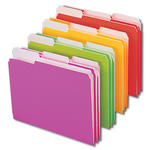 from Smead, pastels hanging folders
from Smead, pastels hanging folders 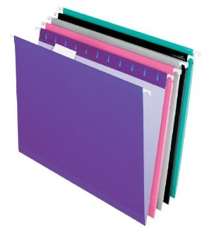 from Pendaflex, bulletin boards
from Pendaflex, bulletin boards 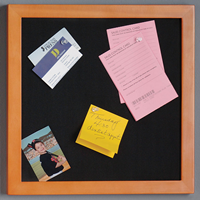 for true vertical organization or See Jane Work‘s magazine boxes
for true vertical organization or See Jane Work‘s magazine boxes 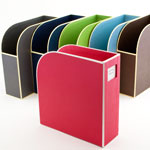 , pick desk accessories that excite or delight you.
, pick desk accessories that excite or delight you.
FUNCTIONALITY
An organized desk helps you save time and money, allowing you to focus on the essential tasks at hand. With reference papers in labeled files (instead of toppling piles) and action items awaiting your attention in a tickler file, you can concentrate on your priorities. 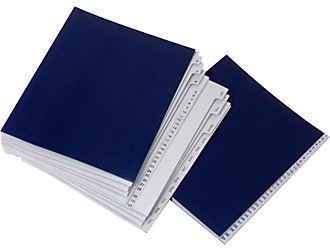
When you organize your desk, bear in mind two categories:
1) What do you have on your desk that you don’t need or want?
Look around your desk right now. Are non-essentials crowding you out of your space? Are there books you intend to read but which have lain untouched for over a week? A month? Consider moving the books to a shelf and making a block in your calendar to read for 20 minutes prior to having lunch each day. A regular time helps you fit reading into your schedule and keeps your aspirational material off the desk. Similarly, put action files away until the work time you’ve schedule actually arrives.
How many pens and pencils do you have? Is your mug filled with pencils you never use (either because they’re stubby and dull or you’re just not a pencil pusher–I mean, user)? Are there thirty pens in various colors and thicknesses, but you only use a Sharpie fine pen in black or a blue Pentel Energel? Donate cheapie pens every time you visit a waiting room or locale where pens seem to go missing.
Do you have a pile of phone books or an overflowing Rolodex you never consult because all of your contacts are programmed into your phone or computer? Away with them!
2) What might you want on your desk that you don’t actually have?
- Do you get up from your desk frequently to find information? Get a bright three-ring binder and fill sheet protectors with essential info like emergency contacts or the configuration data for your wireless router. Perhaps you’d benefit from a printed cheat sheet for making those “funny” symbols for letters to your international clients and emoji to your friends. (Do you do international commerce? Make sure you know your $ from your €.)
- “Don’t put things down; put them away!” This is especially apt in the small, sometimes cramped confines of your desk. Define specific homes for reference and research files in railed filing drawers/cabinets or shelved binders.
- Store action items and office supplies based on my Rule of Proximity & Utility. The more often you use something (or should be using it), the closer it should be to you in the Prime Real Estate of your desk. You don’t, however, need a stack of fifteen Post-It pads on the surface of your desk. Your office supplies are better stored in a distant drawer or cabinet where you can go “shopping” once a week or as needed.
SECURITY
Once you’ve gotten the supplies and gadgets back to your desk or tucked away and the files (more or less) sorted into their action, reference or archived categories, really scrutinize the teeny pieces of paper that adorn your cubicle walls and the other horizontal and vertical surfaces.
How long have those Post-Its bearing passwords been affixed to the monitor for all (from coworkers to cleaning staff) to see? Who else wanders by your office? Customers, vendors, consultants? Friends and family of other employees, maintenance staff and colleagues? Gladys Kravitz? 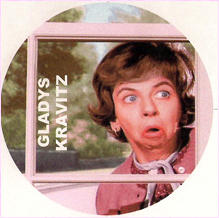
Even in a home office, where only the UPS guy, babysitter and pizza delivery lady see your desk, it’s crucial to protect sensitive data from disclosure—whether that’s your Social Security number and bank data, clients’ proprietary information or personnel files.
The more clutter in your desktop environment, the harder it is to know when something is missing or if prying eyes have settled on them, so:
–Change your passwords, and then do it again frequently. (Alert your spouse/partner at home, and if necessary, clear the changes with your supervisor or IT department at work.)
–Transfer your passwords to a digital password management system like 1Password or LastPass or at least a paper system like Internet Password Organizer.
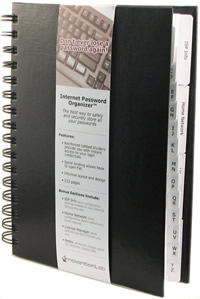
Get out of the habit of posting sensitive information on your walls and the periphery of your computer screen! It’s tempting, but is only convenient until the first time you suffer a digital break-in. Instead:
- Lock sensitive papers and computer backups in fire-safe drawers or filing cabinets
- Secure laptops with security cables and desktop computers with passwords (and firewalls).
- Destroy any sensitive data you no longer need. Think of yourself as a spy like James Bond or Mission Impossible’s Jim Phelps. Just don’t feel that you have to “eat” your words or arrange for items to self-destruct. Shredding should suffice.
REPUTATION
At work, do clients and colleagues sometimes seem reluctant to leave files or important documents with you? Are family members dubious about giving you permission slips to sign or checks to deposit? The problem may be your desk.
Whether or not the impression is accurate, people often assume a cluttered desk represents a cluttered mind. While it’s important to be physically and mentally healthy and improve functional productivity and security, preserving your reputation by keeping your desk clear of clutter and your essentials accessible will help you achieve your goals.
It’s not just cleanliness and functional tidiness that impacts the judgment of others. A University of Michigan study found that too many personal items on your desk can adversely affect your professional image. If more than one in five items on your desk are personal, like photos, toys and stuffed animals, banners, or goofy mugs, those in authority (or in a position to report to authority) might doubt your commitment or work ethic.
And let’s face it, even if your desk is in a home office and there’s no promotion beyond Chief Cook and Bottle Washer, Vice President for Financial Affairs and Co-Chair of Family Strategizing, do you need sub-conscious distraction and lost space due to “desk trinkets” that you probably no longer use or even actually notice?
![]()
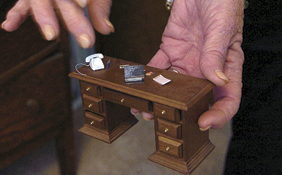
Finally, once you’ve cleaned and organized your desk, reward yourself with a Tiny Desk Concert. Paper Doll‘s favorites? Hey, Marseilles, Nick Lowe and Weird Al Yankovic. But check the archive for the likes of Tom Jones, Vic Chestnut, Mavis Staples, the Australian Chamber Orchestra and more. These Tiny Desk Concerts may become the desk “accessories” you didn’t even know you needed.




Follow Me